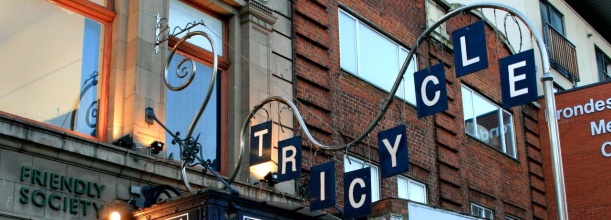Save our Independent Cinemas! This week: the Tricycle Theatre

Location: 269 Kilburn High Road, London NW6 7JR
Screens: 1
Capacity: 300
Tickets: £9.50, concessions/offers available
Visit the Tricycle here!
For the discerning film buff, there are few moments as satisfying as settling down in a pure and unsullied independent cinema, secure in the knowledge that your chosen feature will not be preceded with a Cineworld-branded injunction to buy more coke, an advert for the Vue 18+ screenings or a hypermanic rendition of that mad bloody Odeon song (you remember, this one). There are many dozens of such venues around the country, but few can offer as satisfying an experience as the famous Tricycle, a venue combining celluloid thrills, theatrical treats and a strong social conscience in a uniquely charming setting. Plus it’s in trendy NW6, where all the cool stuff (like my house) is. The Tricycle’s bloody great.

The Tricycle, which has lived more or less halfway down Kilburn High Road in 1980, was originally envisaged as a permanent roost for touring theatre group the Wakefield Tricycle Company. It was converted from the inactive music and dance venue Foresters’ Hall (the Ancient Order of Foresters, whatever that is, is still based in the building), providing the first mass entertainment centre on Kilburn High Road since the glorious Gaumont State Cinema, once host to the Beatles and Marilyn Monroe, became a bingo hall and finally an outpost of terrifying church Ruach Ministries.
Winning early praise for its innovative theatre, which features a circle built on free-standing scaffolding with benches instead of seats, the Tricycle survived early challenges including a devastating fire which swept through the building in 1987, prompting a two-year closure during which time the facility was expanded further. Fast forward to the present day and the Tricycle boasts not only a cinema (opened 1998) but an art gallery, a Creative Space to facilitate its community work, and a solid reputation for producing a relentlessly topical and hard-hitting programme of plays and films. It hosts the UK Jewish Film Festival’s annual London residency, and its series of ‘Tribunal Plays’ depicting public enquiries has, with the support of the BBC, reached a global audience of more than 20 million.

Provided you have the good sense to eschew its relatively normal front door (top) and go in the side way, the Tricycle enchants from the word go. Under the wibbly wobbly sign on the High Road is a metal-floored corridor hung with mobiles, at the other end of which lies the first treat which the Tricycle has in store – a really, really superb café, which will provide you with everything from a pre-show glass of wine to a freshly prepared hot meal waiting for you when your film ends. It’s also a marvellous place to stand and worry whilst trying to catch Rosamund Pike’s eye, but that’s another story. The café opens onto a stark, minimalist gallery space and segues into the main foyer, which is scattered with be-sofaed cubbyholes and usually half-full of milling visitors, and a discreet stairwell leads down to the cinema.
The Tricycle’s solitary screen (below) is plush and purply, with pleasing lights and a very pretty curtain. All of these things are important, but none quite match the majesty of the ineffably kinky ‘lovers’ seats’. You may have noticed these elsewhere – some Everyman cinemas have them, although they’re more like sofas – but the Tricycle has got them down to a T. It’s very simple – make a cinema chair that’s slightly over twice the normal width, put it at the back of the auditorium and watch people jostle for the opportunity to avoid arm-rests and pretend they’re being vaguely naughty! Elsewhere in the cinema there are some legroom issues, although traditionally-scaled humans probably won’t find them a problem, and the fact that all the seating’s a good four metres below street level keeps it cooler than many other small screens.

A word, incidentally, on the staff. Irreproachable. I’ve visited the Tricycle several times over the last month or so, and the service provided in every area of the theatre is uniformly wonderful – whilst the staff at the Prince Charles are knowledgeable if surly and cinema chain slaves are barely reanimated, the Tricycle’s elves are helpful and switched-on whether they’re making a coffee or allotting a ticket.
The Tricycle isn’t especially cheap, but it’s certainly no more expensive than your local Odeon or Vue – it’s probably worth stumping up £9 just for the sake of knowing that nobody will try to sell you popcorn or speak to you whilst wearing anything fluorescent. Plus, there are various discounts available throughout the week – all screenings are £6 on a Monday, two matinees a week are £5.50/£5 including a lovely cuppa, and Brent borough residents have several opportunities a week to take along proof of address and claim a local discount (there’s nothing for you here!). Loveliest of all, every week a small number of tickets are retained for students, the elderly and the disabled on a ‘pay what you can’ basis – you wouldn’t get that at a Cineworld.
The week before the 2011 Oscars will see the Tricycle’s next major film event – a season of international film featuring screenings of thirteen of the films submitted for this year’s Academy Award for Best Feature in a Foreign Language. Six of these films are without a UK distributor, so the Tricycle is once more offering Londoners the opportunity to access art which might not otherwise have a public airing in Britain. It’s one more triumphant gesture from a venue which deserves its place as one of London’s pre-eminent cinemas just as much as it does its theatrical plaudits. We’ll be at every film; if you’ve got any sense at all, we’ll see you there.





Recent Comments